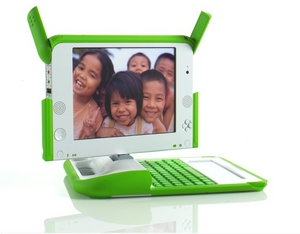The OLPC Wiki/lang-ja
| 翻訳された The OLPC Wiki | 原文 |
| english | عربي | پښتو | български | deutsch | español | français | kreyòl ayisyen | italiano | 日本語 | 한국어 | монгол | Bahasa Melayu | नेपाली | norsk | português | română | русский | kinyarwanda | türkçe | 中文 | 繁體中文 +/- | 変更 |
- This is an on-going translation
OLPC Wikiへようこそ。これはOne Laptop per Childに関連するプロジェクトとコミュニティの共同作業の記録です。現在、9,909のページがあり、約二千人の登録者がいます。ぜひ、参加してアイデアを共有しましょう。
wiki以外のサイト(laptop.org)もあります。
新着情報
- ビルド542は、多くの重要な機能、共同作業、接続性、ジャーナルを誇ります。それはWrite, Read, Chat, Record, Etoys, TamTam, Memorize, Connect4など、多くのアクティビティにおけるリアルタイムの共同作業を含みます。また、インフラやインターネット接続に依存しないコラボレーションを可能にするメッシュポータルポイント(MPP)とアドホックメッシュの自動調整機能をサポートします。インストールの際の盗難防止アクティベーションと学校サーバへの登録およびバックアップも備えます。(OLPC トライアル2 ソフトウェアリリースノートを参照). ビルド542は現在B2-1には適合しないことに注意してください。これらのシステムでは、引き続き ビルド406.15を使ってください。
- Intelが新しいメンバーとしてOLPCに参加しました。
- B4マシンが開発者プログラムに参加した開発者に配られています。実機がなくてもエミュレータを使って、今使っているコンピュータで実行することもできます。テストグループリリースノートは毎日更新されています。また、活動ページで最新の開発の活動を見ることができます。
- このWikiに新しいスキンができました。Simon DornerとOLPCオーストラリアのみなさん、ありがとう。(ログインした後にスペシャルプリファレンスを使ってスキンを変えることができます).
- あなたのウェブサイトにOLPCバッジを貼りませんか。
- ナイジェリアのGaladimaの学校におけるOLPCの報告です。
- OLPCはBridging Nationsのブリッジビルダー賞を受賞しました。これはデジタルデバイドへの橋渡しとなる技術革新に贈られるものです。
週毎のアップデートは「現在のイベント」にあります。
One Laptop per Child(OLPC)について
- 「これは教育のプロジェクトだ。ラップトップのプロジェクトではない。」
ここはOne Laptop per Child(一人の子供に一台のラップトップ; OLPC)のWikiです。この非営利団体の目的は、低価格のノートパソコン— $100 ラップトップ—と世界の子供たちを教育する方法についての革命的な技術を開発することです。私たちのゴールは世界中の子供たちに探求や経験、自己表現の機会を提供することです。
なぜ発展途上国の子供たちにラップトップが必要なのでしょうか。 ラップトップは、世界に開かれた窓であり、考えるための道具です。それらは、独立した相互作用と探索を通じて、すべての子供が学ぶことを学ぶためのすばらしい方法です。
OLPCは5つの基本原則を支持します。(1)子供の所有権 (2)低年齢 (3)浸透 (4)接続性 (5)フリーかつオープンソース。
さらに多くのラップトップ とOLPCの学習に対する考え方があります。
ここにあるもの
このWikiを探検するに当たって、最初にOne Laptop per Childを読むと良いでしょう。ここにはプロジェクトの概要があります。また、よくある質問と答え(FAQ)の一覧、質問の場所、OLPCへの関与と 参加、ハードウェア、ソフトウェア、コンテンツ、開発者プログラムについての多くのページ、そして独立したソフトウェア開発Wikiがあります。Sugarは新しいインタフェースで、そのインタフェースガイドラインがあります。配布と国ごとの問題についての議論をするためのページもあります。詳細な目次もあります。最新ビルドは常に ここにあります。最新の安定版は常に ここです。
このWikiについて
このWikiの目的はプロジェクトについての情報を共有し、アイデアとフィードバックを生み出すことです。記事と議論は、技術的なものから認識論に至るまで多岐にわたります。すべてのページへのコメントを歓迎します(それぞれのページの「ノート」タブを使ってください)。記事自体の編集は事実のみにとどめ、意見は控えてください。作業したものに署名して、引用とリンクを自由に使用できるようにすることを勧めます(コメントの署名として、アカウントを作成して使ってください)。{{OLPC}}テンプレートを含むページはOLPCチームによって保守されており、現在のプロジェクトの状況を代表していることに注意してください。一般の人によって保守される他のページはそのことを念頭において読む必要があります。
